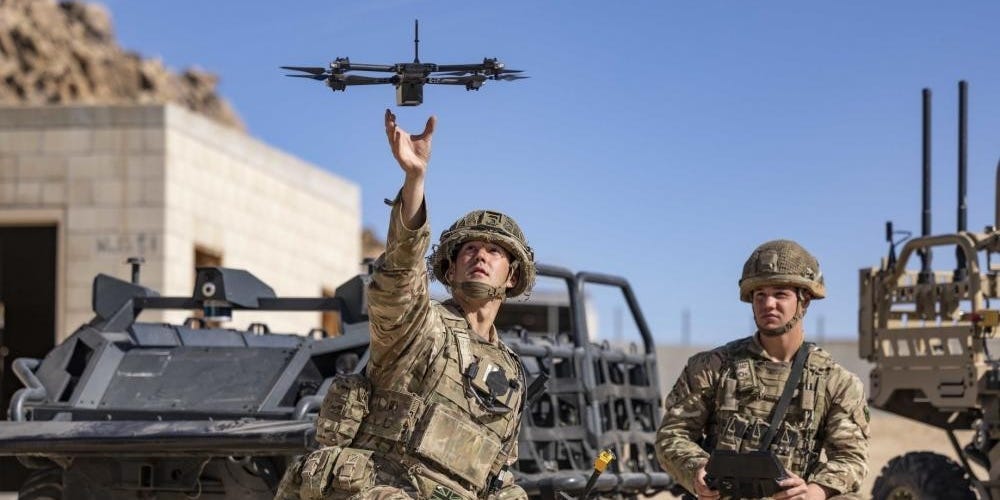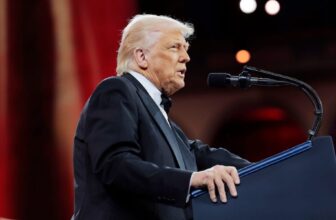
Try our newest merchandise
- Army leaders argue AI has an essential position in future warfare.
- There’s been a shift in trade collaboration with the Division of Protection on AI and autonomy.
- AI in navy tech should adhere to moral frameworks, Snowpoint Ventures’ Doug Philippone mentioned.
No person desires “killer robots,” so ensuring synthetic intelligence programs do not go rogue is the “price of doing enterprise” in navy tech, the founding father of a enterprise capital agency mentioned throughout a Wednesday dialogue of AI expertise on the battlefield.
“You’ve to have the ability to make AI that may work inside an moral framework, interval,” Doug Philippone, co-founder of Snowpoint Ventures, a enterprise capital agency that merges tech expertise with protection points, mentioned throughout the Reagan Institute’s Nationwide Safety Innovation Base Summit.
“I do not suppose anyone is, you realize, attempting to have killer robots which can be simply operating round by themselves,” he mentioned.
Philippone defined that corporations working within the navy expertise house which can be value investing in will need to have “thought via these issues and work in that moral atmosphere.” He mentioned these aren’t limitations on growth. As an alternative, they’re necessities.
Autonomous machines are likely to trigger a sure diploma of apprehension, particularly when such tech is utilized to the DoD’s “kill chain.” Whereas navy leaders keep that the programs are important for future warfare, in addition they pose moral issues about what machine autonomy would possibly finally imply.
Occasions are altering
The defense-technology house seems to be experiencing a serious shift in perspective. Final month, Google reversed course on a earlier pledge in opposition to growing AI weapons, prompting criticism from some staff. The transfer appeared to replicate a higher willingness amongst extra tech corporations to work with the Protection Division on these applied sciences.
All through Silicon Valley, “there’s been an enormous cultural shift from ‘no manner we’re fascinated with defending America’ to ‘let’s get within the combat,'” mentioned Thomas Robinson, the Chief Working Officer of Domino Knowledge Lab, a London-based AI options firm.
He mentioned at Wednesday’s occasion that “it’s only a palpable distinction between even just a few years in the past.”
There was a pointy rise in smaller, extra agile protection expertise companies, akin to Anduril, breaking into areas like uncrewed programs and autonomy, spurring a view amongst some protection tech leaders that the brand new Trump administration may create new DoD contract alternatives doubtlessly value tons of of tens of millions, if not billions, of {dollars}.
A part of that cultural shift has spurred issues round “revolving doorways” of navy officers heading to the enterprise capital tech realm after retirement, creating doable conflicts of curiosity.
Air Drive picture by Richard Gonzales
US navy leaders have more and more prioritized the event of AI capabilities in recent times, with some arguing that whichever facet dominates this tech house would be the winner in future conflicts.
Final yr, then-Air Drive Secretary Frank Kendall mentioned the US is locked in a technological arms race with China. AI is essential, he mentioned, and “China is transferring ahead aggressively.”
The Air Drive has been experimenting with AI-piloted fighter plane, amongst different AI-enabled instruments, as produce other parts of the US navy and American allies. “We will be in a world the place choices won’t be made at human pace,” Kendall mentioned in January. “They’ll be made at machine pace.”
Sure areas of armed battle, together with cyber warfare and digital warfare, are prone to be dominated by AI applied sciences that assess occasions occurring at unimaginably quick speeds and unimaginably small dimensions.
AI with guardrails
That makes AI a prime funding. Throughout Wednesday’s dialogue, US congressional consultant Ro Khanna of California expressed assist for a proposal from 2020 Democratic presidential candidate Michael Bloomberg, which referred to as for shifting 15% of the huge Pentagon price range to superior and rising tech.
Because the nominee for protection secretary, Pete Hegseth dedicated to prioritizing new expertise, writing that “the Division of Protection price range should concentrate on lethality and innovation.” He mentioned that “expertise is altering the battlefield.”
However moral concerns stay key. Final yr, senior Pentagon officers, as an illustration, mentioned guardrails put in place to calm fears that it was “constructing killer robots within the basement.”
Understanding precisely how an AI software’s algorithms work will probably be essential for moral battlefield implementation, Philippone famous, and so will understanding the standard of information being absorbed — in any other case, it is “rubbish in, rubbish out.”
“Whether or not it is Tyson’s Rooster or it is the Division of the Navy, you need to have the ability to say ‘this drawback is essential,” he defined. “What’s the information stepping into?”
“You perceive the way it flows via the algorithms, and then you definitely perceive the output in a manner that’s auditable, so you may perceive how we received there,” he mentioned. “And then you definitely codify these guidelines.”
Philippone mentioned the opacity of some AI corporations’ proprietary data is “BS” and a “black field strategy” to expertise. He mentioned that corporations ought to as a substitute purpose for a extra clear strategy to synthetic intelligence.
“I name it the glass field,” he mentioned. Understanding how the interior workings of a system work may help keep away from hacks, he mentioned, “that is actually essential from an ethics perspective and actually understanding the method of your resolution in your group.”
“If you cannot audit it,” he mentioned, “that leaves you vulnerable.”

![[Windows 11 Pro]HP 15 15.6″ FHD Business Laptop Computer, Quad Core Intel i5-1135G7 (Beats i7-1065G7), 16GB RAM, 512GB PCIe SSD, Numeric Keypad, Wi-Fi 6, Bluetooth 4.2, Type-C, Webcam, HDMI, w/Battery](https://m.media-amazon.com/images/I/71LYTzK2A8L._AC_SL1500_.jpg)



![[UPDATED 2.0] Phone mount and holder compatible with Samsung Z Fold 2 3 4 5 6 Pixel Fold or Foldable phone | bicycle, treadmill, handlebar, elliptical, stroller, rail, handle, roundbar, golf cart](https://m.media-amazon.com/images/I/51CjGlidGRL._SL1023_.jpg)








